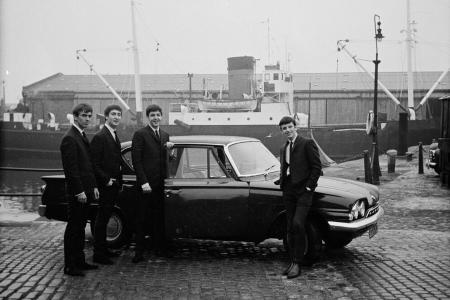Not just a passing fab
New documentary The Beatles: Eight Days A Week — The Touring Years reminds us why the Fab Four are still loved after all these decades
John Lennon, Paul McCartney, George Harrison and Ringo Starr.
They are not just musicians, but icons. Not just performers, but rock stars.
These four Liverpool lads found fame as part of The Beatles, and are forever enshrined in the annals of pop culture history.
Even the most sceptical non-fans cannot deny their impact on pop music, and presentday boy bands can only dream of their phenomenal appeal, enduring chemistry and lasting success.
They remain the best-selling band in history, selling over a billion albums worldwide and holding the record for the most No. 1 hits on the US Billboard Hot 100 chart (20).
The proof, as the British like to say, is in the pudding. New documentary film The Beatles: Eight Days A Week — The Touring Years, directed by Ron Howard, traces their humble beginnings to the height of their fame from 1963 to 1966, when Beatlemania ruled.
The documentary opens here on Nov 3. Here are three reasons why we still love the Beatles today.

THEIR MUSIC WAS AWESOME
“By the end, it became quite complicated,” Mc- Cartney said of The Beatles in an interview for the film.
“But at the beginning, things were really simple.”
The Beatles were formed out of a love for music by four friends who really enjoyed getting together to write and play songs on the guitar, drums and bass.
“We just wanted to play,” Starr said. “Playing was the most important thing.”
From simple pop ditties (I Want to Hold Your Hand) to more mature tunes (Help!) and later, experimental Indian-inspired rock (Tomorrow Never Knows), The Beatles were massively creative and prolific.
When they were tired of being The Beatles, they reinvented themselves as Sgt. Pepper’s Lonely Hearts Club Band. The resulting experimental album of the same name went on to become Rolling Stone magazine’s choice for best rock ‘n’ roll album ever made.

THEY WERE LOVABLE
It’s clear from the film that The Beatles were extremely funny. Especially Starr.
In one archival interview, when he was asked how the band managed to maintain their zest on stage despite playing so many shows, he cheekily replied: “Well, we do the zest we can.”
At another point, he responded to a query on whether The Beatles were just a bunch of British Elvis Presleys by wiggling his hips like the King of Rock ‘n’ Roll and joked: “No, it’s not true.”
Girls loved The Beatles because there was a type for every swooning female; McCartney was the cute one, Lennon the smart one, Starr the funny one, and Harrison the quiet one. The Beatles:
Eight Days A Week — The Touring Years humanises The Beatles, sharing their hopes, dreams and how they found comfort in each others’ friendship.

THEY USED THEIR FAME FOR GOOD
The Fab Four weren’t just musicians, they were also civil rights activists. In the film, it is revealed that The Beatles opposed the segregation of blacks and whites during their 1964 US tour, and insisted that their audience should be mixed.
“It’s a bit silly to segregate people,” McCartney told DJ Larry Kane at the time.
“I just think it’s stupid. You can’t treat other human beings like animals.
“That’s the way we all feel, and that’s the way people in England feel, because there’s never any segregation in concerts in England — and if there was, we wouldn’t play ‘em.”
Thanks to The Beatles, promoters for their Jacksonville, Florida, concert agreed to allow a mixed audience at the concert.
“We played to people,” said Starr. “We didn’t play to those people or that people — we just played to people.”
“I never thought of them as being white; they were colourless,” Beatles fan Whoopi Goldberg said in an interview. “I felt I could be friends with them.” For those of us who grew up with their music, The Beatles are friends to us all.
Get The New Paper on your phone with the free TNP app. Download from the Apple App Store or Google Play Store now


